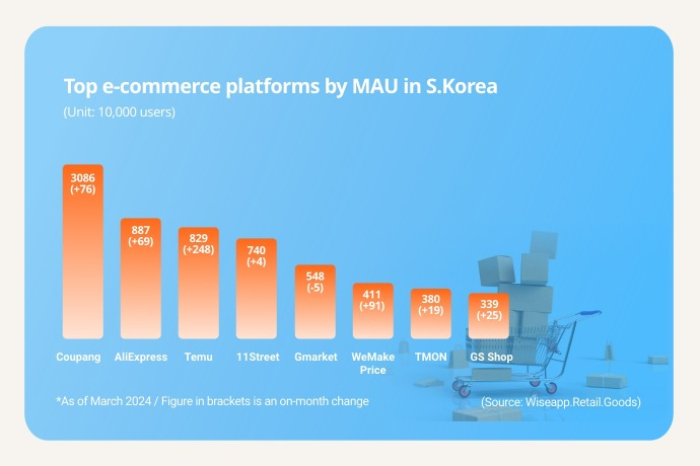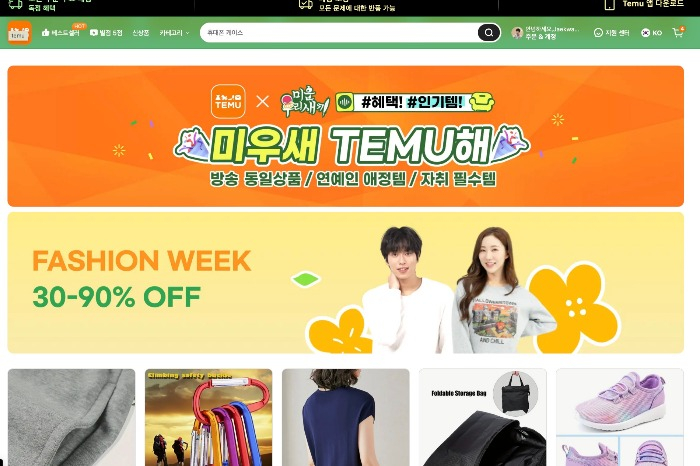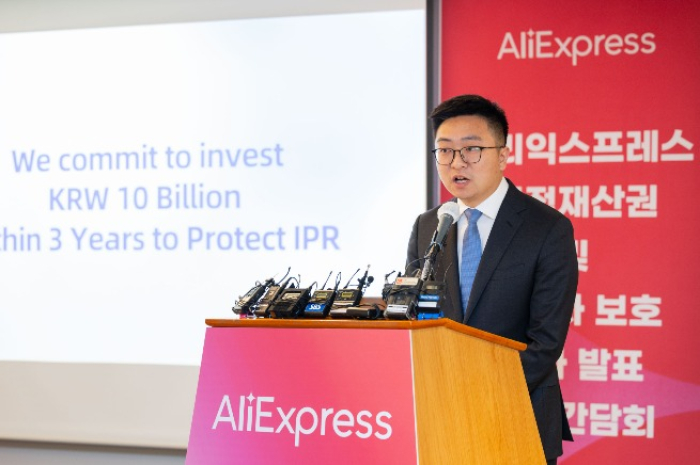AliExpress, Temu threaten Coupang’s lead in S.Korea
Monthly active users of the Chinese online marketplaces each surpassed 8 million, more than Korean competitors’ MAU
By Apr 05, 2024 (Gmt+09:00)
LG Chem to sell water filter business to Glenwood PE for $692 million


Kyobo Life poised to buy Japan’s SBI Group-owned savings bank


KT&G eyes overseas M&A after rejecting activist fund's offer


StockX in merger talks with Naver’s online reseller Kream


Mirae Asset to be named Korea Post’s core real estate fund operator



Coupang Inc. is the only South Korea-native e-commerce platform with more monthly active users than China's e-commerce giants AliExpress and Temu in Korea following the rapid ascent of Chinese online shopping mall operators despite growing complaints about their fake and low-quality products.
Monthly active users of AliExpress and Temu in Korea added 8% and 42% on-month in March to 8.87 million and 8.29 million, respectively, according to Korea-based mobile app analytics firm Wiseapp.Retail.Goods on Thursday.
The two Chinese e-commerce platforms now rank second and third, respectively, in the Korean e-commerce platform market by MAU after beating direct local competitors such as 11Street, Gmarket and WeMakePrice.
Despite different business models, the Chinese e-commerce giants are encroaching on Korea’s e-commerce behemoth Coupang's lead with more than 30 million MAUs.
AliExpress and Temu are online marketplaces allowing third-party merchants to directly list, sell and ship their products to consumers, whereas Coupang mainly sells and delivers a variety of its own inventory already purchased from outside merchants.

Temu’s rise in Korea is notably faster than its crosstown peer AliExpress, which entered the Korean market in 2018. Temu’s monthly users topped 8 million just seven months after arriving in Korea last year. Its users jumped nearly 2.5 million from February to March of this year.
To speed up their advance into the Korean market, the Chinese e-commerce platform operators have vowed to invest more to expand their Korean offices and set up fulfillment centers, a move expected to directly threaten Coupang as well as Kurly Inc. and SSG.COM, which also sell their own inventory.
DETERMINED TO CRACK HOMEGROWN E-COMMERCE DOMINANCE
Temu is fearless in spending money to improve its brand awareness.
According to global investment bank JP Morgan Chase & Co., Temu is estimated to have spent $1.7 billion on global marketing last year. It is expected to nearly double its marketing budget to $3 billion this year from last year.
Temu ads are everywhere in the virtual space. Korea is no exception as Temu appears on top when googling any product in the country.

The popular Chinese discount online marketplace is expected to contract with a local agency to even advertise on Korea’s largest portal Naver, according to industry sources.
Its operator PDD Holdings Inc., formerly Pinduoduo, has also set up a Korean entity, Whaleco Korea LLC, heralding its more aggressive foray into Korea.
While Temu allows China-based vendors to sell and ship directly to customers without relying on intermediate distributors in the destination country to lower prices, AliExpress has gone a step further by adding Korean retailers to its platform to sell both Chinese and Korean products to Korean consumers.
Korean brands available on AliExpress include LG H&H Co., formerly LG Household & Health Care; beauty product maker Aekyung Industrial Co. and tissue paper companies KleanNara Co. and Yuhan-Kimberly Ltd.
The Chinese online marketplace giant even sells fresh strawberries and products of Korea’s biggest food maker CJ CheilJedang Corp.
Its parent Alibaba in mid-March announced a plan to invest about $1.1 billion in Korea over the next three years while promising Korean consumers unconditional returns and refunds within 90 days for cross-border online purchases.

In January, it even offered a promotion to take zero commissions from Korean vendors to encourage them to sell their products at AliExpress, underlining the Chinese e-commerce giant’s strong will to conquer the Korean e-commerce market.
COMPLAINTS GROW
Chinese e-commerce giants’ success in the Korean market has, however, comes at the cost of quality.
The Korean government last month announced a set of consumer protection measures targeting overseas online shipping platform operators upon receiving increasing complaints about fake products and the lack of dispute settlement services by e-commerce sites.
Industry officials said the government’s move to strengthen regulations in the country’s e-commerce sector is largely aimed at Chinese e-commerce players' rapid expansion in Korea.
In 2023, Chinese platforms accounted for 48.7% of Koreans’ online shopping while US online shopping malls took 27.5%, according to Korea Customs Service data.
Write to Jae-Kwang Ahn at ahnjk@hankyung.com
Sookyung Seo edited this article.
-
 RegulationsSouth Korea gets tough with Chinese platforms AliExpress, Temu, Shein
RegulationsSouth Korea gets tough with Chinese platforms AliExpress, Temu, SheinMar 13, 2024 (Gmt+09:00)
3 Min read -
 E-commerceAliExpress sells top K-food maker’s products in S.Korea
E-commerceAliExpress sells top K-food maker’s products in S.KoreaMar 08, 2024 (Gmt+09:00)
3 Min read -
 E-commerceKorea probes AliExpress as Chinese e-commerce threat grows
E-commerceKorea probes AliExpress as Chinese e-commerce threat growsMar 07, 2024 (Gmt+09:00)
4 Min read -
 E-commerceAliExpress’ zero-commission offer jolts Coupang, Naver
E-commerceAliExpress’ zero-commission offer jolts Coupang, NaverJan 31, 2024 (Gmt+09:00)
2 Min read -

-
 E-commerceChina’s Temu challenges homegrown e-commerce platforms in Korea
E-commerceChina’s Temu challenges homegrown e-commerce platforms in KoreaOct 19, 2023 (Gmt+09:00)
3 Min read -
 RetailAlibaba launches express ships to S.Korea as orders surge
RetailAlibaba launches express ships to S.Korea as orders surgeJul 20, 2023 (Gmt+09:00)
3 Min read


